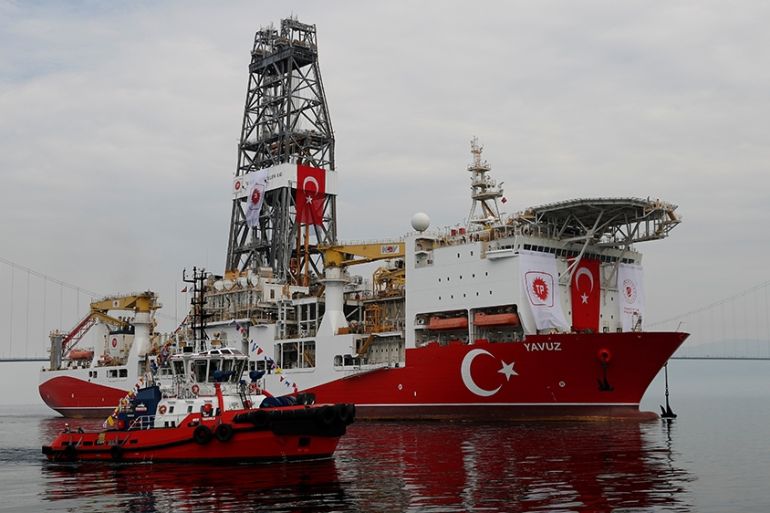EU draft signals sanctions on Turkey over Cyprus drilling
EU set to curb contacts and funding for Turkey over what it calls Ankara’s “illegal” drilling off Cyprus – Reuters.

The European Union is set to curb contacts and funding for Ankara in retaliation for what it calls Turkey‘s “illegal” drilling for gas and oil off Cyprus – and the EU stands ready to ramp up sanctions further, a draft statement seen by Reuters news agency shows.
In trying to take Ankara to task for what the EU sees as Turkish interference with Cyprus’s exclusive economic zone, the bloc is walking a thin line, careful not to antagonise an important partner.
Keep reading
list of 4 itemsGeorgia’s ‘foreign agents’ bill: What’s the controversy about? What’s next?
What’s at stake in next month’s European elections?
EU to drop rule-of-law dispute with Poland
“Despite our best intentions to keep good neighbourly relations with Turkey, its continued escalation and challenge to the sovereignty of our member state Cyprus will inevitably lead the EU to respond in full solidarity,” Donald Tusk, president of the European Council, said on Wednesday.
On Thursday, national envoys in Brussels were discussing a joint decision to punish Turkey, a draft of which said:
“In light of Turkey’s continued and new illegal drilling activities, the [EU] decides to suspend negotiations on the Comprehensive Air Transport Agreement and agrees not to hold further meetings of the high-level dialogues for the time being.”
“The Council endorses the [European] Commission’s proposal to reduce the pre-accession assistance to Turkey for 2020 and invites the European Investment Bank to review its lending activities in Turkey, notably with regard to sovereign-backed lending,” it said.
The statement added that the EU would be ready to introduce more restrictive measures against Turkey should Ankara continue drilling.
In 2014-20, the EU was due to give Turkey 4.45 billion euros ($5bn) for political reforms, agriculture and other projects to help it prepare for eventual membership in the bloc.
But last year, Brussels took away 175 million euros ($197m) in protest over what it saw as deteriorating human rights in Turkey. The EU has said Ankara under President Recep Tayyip Erdogan is moving further away from the bloc.
But because the bloc needs Turkey in matters such as security and migration, an EU diplomat involved in the latest discussions told Reuters any future sanctions would be limited.
“It would only be targeting people linked to these specific illegal activities. We’re trying to calibrate that carefully because we need Turkish cooperation on migration, NATO [and] countering terrorism.”
“Some member states rely on Turkey for energy transit, so we must tread carefully. Don’t expect any wide economic sanctions.”
Ankara on Wednesday rejected Greek and EU criticism that Turkish drilling off Cyprus was illegitimate. On the divided island of Cyprus, an internationally recognised government is part of the EU but Turkey backs a breakaway area.
On Thursday, Omer Celik, a spokesperson for Turkey’s ruling AK Party, said the sanctions against Ankara would be a huge mistake for the EU.
“We want to indicate that this would be a great lack of vision and a historic mistake for the EU,” Celik told reporters.
“The EU should act on principles instead of taking the Greek Cypriot side. A mutual mechanism must be formed, where the Turkish Cypriot side will be an equal party, and the sharing of profits are linked to a sound mechanism. That’s how the crisis will be overcome,” Celik added.
While Nicosia was pushing for tougher language on sanctions, some other EU states were wary of shutting down all high-level channels of communication with Ankara, diplomats said, meaning the draft decision could still change.
The EU depends on Turkey to keep a lid on migration from the Middle East to Europe, but the relationship has soured over Erdogan’s crackdown on critics following a failed coup in 2016.
The EU has frozen Turkey’s long-stalled membership talks as well as negotiations on upgrading its customs union, accusing Erdogan of widespread violations of human rights.